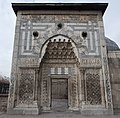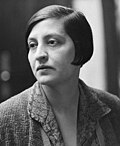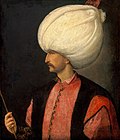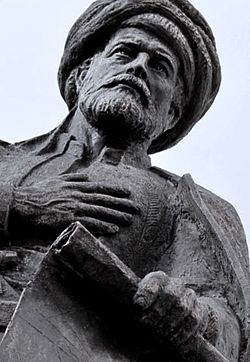Ehsan Danish
Merhaba! Türkiye portalına hoş geldiniz. Hi! Welcome to the Turkey portal.
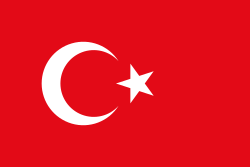 | |
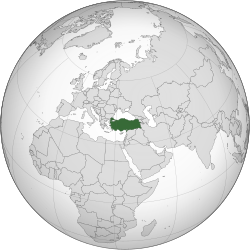
| |
Turkey, officially the Republic of Türkiye, is a country mainly located in Anatolia in West Asia, with a relatively small part called East Thrace in Southeast Europe. It borders the Black Sea to the north; Georgia, Armenia, Azerbaijan, and Iran to the east; Iraq, Syria, and the Mediterranean Sea to the south; and the Aegean Sea, Greece, and Bulgaria to the west. Turkey is home to over 85 million people; most are ethnic Turks, while ethnic Kurds are the largest ethnic minority. Officially a secular state, Turkey has a Muslim-majority population. Ankara is Turkey's capital and second-largest city. Istanbul is its largest city and economic center. Other major cities include İzmir, Bursa, and Antalya.
First inhabited by modern humans during the Late Paleolithic, present-day Turkey was home to various ancient peoples. The Hattians were assimilated by the Hittites and other Anatolian peoples. Classical Anatolia transitioned into cultural Hellenization after Alexander the Great's conquests, and later Romanization during the Roman and Byzantine eras. The Seljuk Turks began migrating into Anatolia in the 11th century, starting the Turkification process. The Seljuk Sultanate of Rum ruled Anatolia until the Mongol invasion in 1243, when it disintegrated into Turkish principalities. Beginning in 1299, the Ottomans united the principalities and expanded. Mehmed II conquered Constantinople (modern-day Istanbul) in 1453. During the reigns of Selim I and Suleiman the Magnificent, the Ottoman Empire became a global power. From 1789 onwards, the empire saw major changes, reforms, centralization, and rising nationalism while its territory declined.
In the 19th and early 20th centuries, persecution of Muslims during the Ottoman contraction and in the Russian Empire resulted in large-scale loss of life and mass migration into modern-day Turkey from the Balkans, Caucasus, and Crimea. Under the control of the Three Pashas, the Ottoman Empire entered World War I in 1914, during which the Ottoman government committed genocides against its Armenian, Greek, and Assyrian subjects. Following Ottoman defeat, the Turkish War of Independence resulted in the abolition of the sultanate and the signing of the Treaty of Lausanne. Turkey emerged as a more homogenous nation state. The Republic was proclaimed on 29 October 1923, modelled on the reforms initiated by the country's first president, Mustafa Kemal Atatürk. Turkey remained neutral during most of World War II, but was involved in the Korean War. Several military interventions interfered with the transition to a multi-party system.
Turkey is an upper-middle-income and emerging country; its economy is the world's 16th-largest by nominal and 12th-largest by PPP-adjusted GDP. As the 15th-largest electricity producer in the world, Turkey aims to become a hub for regional energy transportation. It is a unitary presidential republic. Turkey is a founding member of the OECD, G20, and Organization of Turkic States. With a geopolitically significant location, Turkey is a NATO member and has its second-largest military force. It may be recognized as an emerging, a middle, and a regional power. As an EU candidate, Turkey is part of the EU Customs Union.
Turkey has coastal plains, a high central plateau, and various mountain ranges; its climate is temperate with harsher conditions in the interior. Home to three biodiversity hotspots, Turkey is prone to frequent earthquakes and is highly vulnerable to climate change. Turkey has a universal healthcare system, growing access to education, and increasing levels of innovativeness. It is a leading TV content exporter. With numerous UNESCO World Heritage sites and intangible cultural heritage inscriptions, and a rich and diverse cuisine, Turkey is the fifth most visited country in the world. (Full article...)
Selected article -
Turks (Turkish: Türkler), or Turkish people, are the largest Turkic ethnic group, comprising the majority of the population of Turkey and Northern Cyprus. They generally speak the various Turkish dialects. In addition, centuries-old ethnic Turkish communities still exist across other former territories of the Ottoman Empire. Article 66 of the Constitution of Turkey defines a Turk as anyone who is a citizen of the Turkish state. While the legal use of the term Turkish as it pertains to a citizen of Turkey is different from the term's ethnic definition, the majority of the Turkish population (an estimated 70 to 75 percent) are of Turkish ethnicity. The vast majority of Turks are Sunni Muslims, with a notable minority practicing Alevism.
The ethnic Turks can therefore be distinguished by a number of cultural and regional variants, but do not function as separate ethnic groups. In particular, the culture of the Anatolian Turks in Asia Minor has underlain and influenced the Turkish nationalist ideology. Other Turkish groups include the Rumelian Turks (also referred to as Balkan Turks) historically located in the Balkans; Turkish Cypriots on the island of Cyprus, Meskhetian Turks originally based in Meskheti, Georgia; and ethnic Turkish people across the Middle East, where they are also called Turkmen or Turkoman in the Levant (e.g. Iraqi Turkmen, Syrian Turkmen, Lebanese Turkmen, etc.). Consequently, the Turks form the largest minority group in Bulgaria, the second largest minority group in Iraq, Libya, North Macedonia, and Syria, and the third largest minority group in Kosovo. They also form substantial communities in the Western Thrace region of Greece, the Dobruja region of Romania, the Akkar region in Lebanon, as well as minority groups in other post-Ottoman Balkan and Middle Eastern countries. The mass immigration of Turks also led to them forming the largest ethnic minority group in Austria, Denmark, Germany, and the Netherlands. There are also Turkish communities in other parts of Europe as well as in North America, Australia and the Post-Soviet states. Turks are the 13th largest ethnic group in the world. (Full article...)
General images
Did you know -
- ... that Cold War-era spy Hüseyin Yıldırım, sentenced to life without parole in the United States, was later pardoned and secretly extradited to Turkey, where he stayed only one day in prison? (April 2, 2014)
- ... that the Mosque of Kefeli in Istanbul was used jointly as a church by Roman Catholic and Armenian believers before becoming a mosque? (July 20, 2007) Wikipedia:Recent additions 155
- ... that the Battle of Wawon is considered to be Turkey's first real combat action since the end of World War I? (December 1, 2009)
- ... that Kazakhstan and Turkey have sought to promote closer bilateral relations and foster close ties between Turkic nations of Central Asia? (October 16, 2008) Wikipedia:Recent additions 232
- ... that the Turkish military coup of 1971 is known as a coup by memorandum? (August 10, 2004) Wikipedia:Recent additions 13
- ... that the Roman Catholic Church of St. Mary Draperis in Istanbul has been leveled by earthquake, forcibly demolished by the Ottoman Government, and destroyed three times by fire? (March 24, 2012)
- ... that the Hood Event was an incident following the US invasion of Iraq where a group of Turkish special forces operating in northern Iraq was captured and interrogated by the US military, later becoming the basis for the 2006 film Valley of the Wolves Iraq? (February 24, 2006) Wikipedia:Recent additions 55
Selected picture
Selected biography -
Muhiddin Piri (c. 1470 – 1553), better known as Piri Reis (Turkish: Pîrî Reis), was an Ottoman cartographer, admiral, navigator, corsair, and geographer. He is primarily known today for his cartographic works, including his 1513 world map and the Kitab-ı Bahriye (Book of the Sea), a book with detailed information on early navigational techniques as well as relatively accurate charts for their time, describing the ports and cities of the Mediterranean Sea.
He was born in Gelibolu—a major Ottoman naval base—and sailed from an early age with his uncle Kemal Reis. They fought as corsairs in the Western Mediterranean until they were brought into the Ottoman Navy. Piri Reis fought alongside Kemal Reis in the Ottoman–Venetian wars. When his uncle died in 1511, Piri Reis returned to Gelibolu to begin his cartographic works. He created the 1513 world map during this period and likely began drafting the charts and notes that would form the basis of the Kitab-ı Bahriye. By 1516, he returned to the navy and took part in the Ottoman conquest of Egypt. After their victory, he presented the 1513 world map to Sultan Selim I. When Suleiman the Magnificent became sultan, Piri Reis completed the first version of the Kitab-ı Bahriye, which he dedicated and gifted to the sultan by 1521. Several years later, he created a more elaborate version at the urging of Grand Vizier Pargalı Ibrahim Pasha. His final surviving work is a 1528 world map, of which only the northwest corner remains (showing Greenland, Labrador, Newfoundland, Florida, Cuba, Hispaniola, Jamaica, and Central America). (Full article...)
Selected video -
Selected quote -
| “ | A satiated man doesn't know what's hunger, a healthy man doesn't know what's disease. | ” |
Recognized content
Provinces
Related portals
Religions in Turkey
Neighbouring countries
Countries with related heritage
WikiProjects
Turkish wikipedia
 |
There is a Turkish version of Wikipedia, the free encyclopedia. |
Wikimedia
The following Wikimedia Foundation sister projects provide more on this subject:
-
 Commons
Commons
Free media repository -
 Wikibooks
Wikibooks
Free textbooks and manuals -
 Wikidata
Wikidata
Free knowledge base -
 Wikinews
Wikinews
Free-content news -
 Wikiquote
Wikiquote
Collection of quotations -
 Wikisource
Wikisource
Free-content library -
 Wikiversity
Wikiversity
Free learning tools -
 Wikivoyage
Wikivoyage
Free travel guide -
 Wiktionary
Wiktionary
Dictionary and thesaurus
-

-

-

-

-
Random portal

 Read
Read
 AUTHORPÆDIA is hosted by Authorpædia Foundation, Inc. a U.S. non-profit organization.
AUTHORPÆDIA is hosted by Authorpædia Foundation, Inc. a U.S. non-profit organization.










